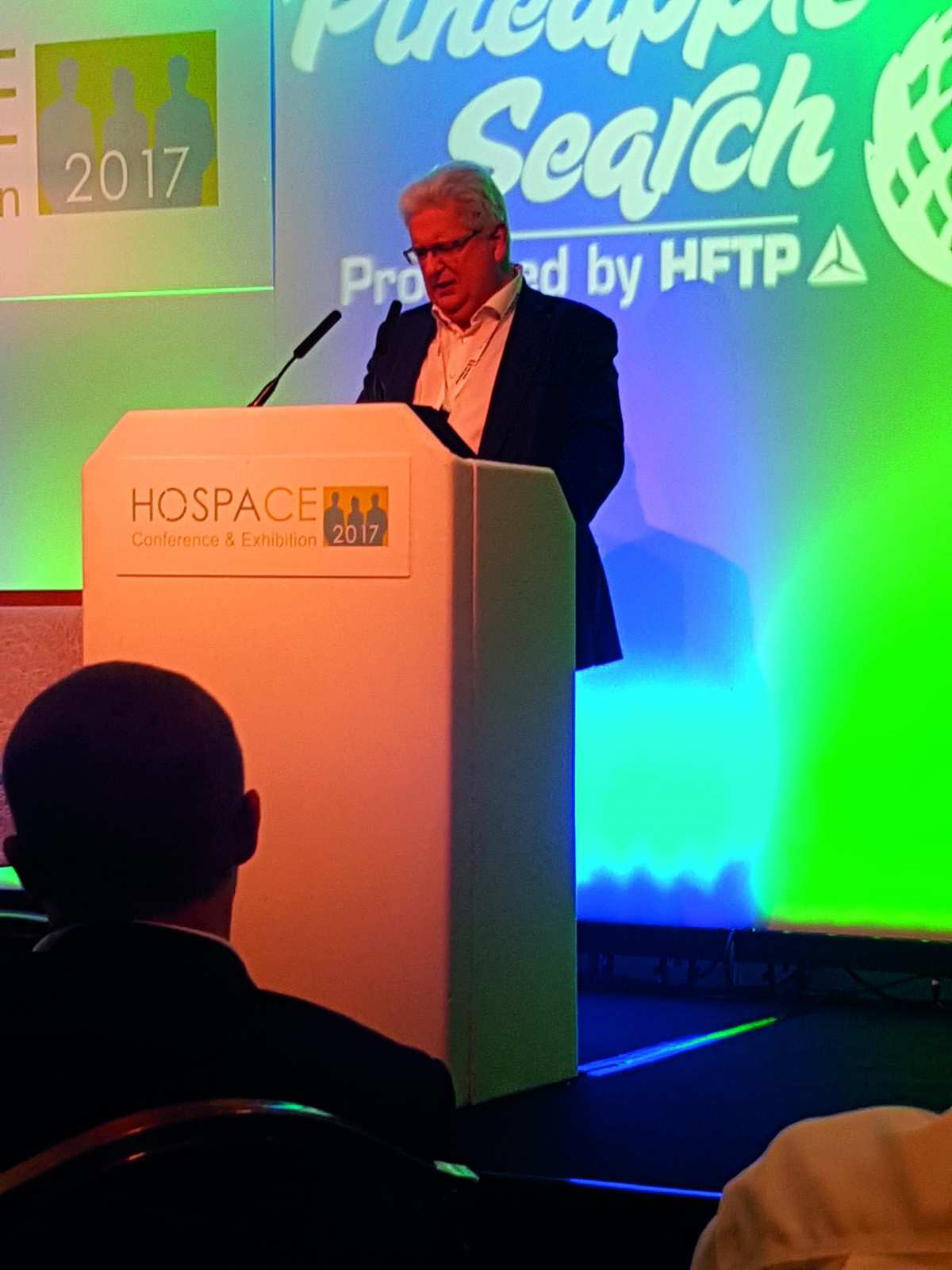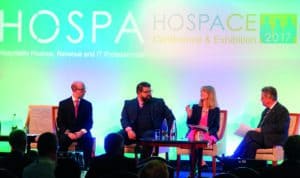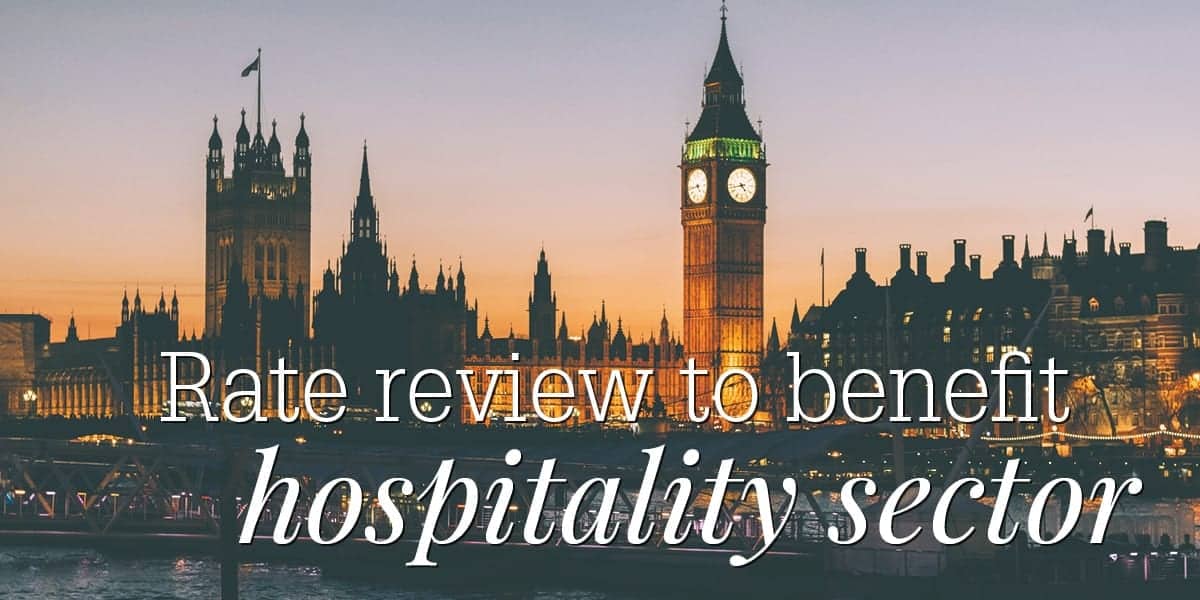
Staff retention is critical for the hospitality sector
Opening the panel discussion at Hospace conference and exhibition on the impact of Brexit on the industry, BHA economic policy advisor John Guthrie presented his overview of the situation regarding the UK’s probable departure from the EU, and suggested the consequences arising from the end of free movement could be dramatic for the industry.
Luxury bed & breakfast operations, inns and independent hotels must focus as never before upon employee retention, Guthrie warned a packed hall of delegates at this year’s HOSPA conference and exhibition (HOSPACE), which was held for the first time in central London last month.
At the time of the build-up to the Maastricht Treaty the idea that Britain was going to get a deal, or secure its opt-outs from the single currency or social chapter, was viewed as deeply improbable.
Although the economic and political canvas today is much more difficult and Conservative party policy more complex, there are 27 member states to negotiate with, not 11, it has to be the case that Brexit must be viewed by businesses if not as a certainty then a probability. Efforts by the likes of Nick Clegg, Andrew Adonis and Ken Clarke going to Brussels and so forth are all very interesting but I think businesses should regard Brexit as overwhelmingly probable, but that they should only regard a transitional deal as probable.
Probabilities today are all well and good, but it was probably the case that the UK was going to vote to stay in the EU, it was probably the case that Hilary Clinton was going to win the US presidential election, and it was also probably the case that Jeremy Corbyn was going to get annihilated. So probabilities are much more difficult today than they were 25 years ago.
When the referendum result came through last year, many of us in the industry came to realise very quickly that the consequences were potentially very serious for our industry because of the end of free movement.
If I just concentrate on employment, the end of free movement will have potentially very serious consequences indeed.
If we just take a few simple numbers, we estimate there are 3.2m direct employment jobs in hospitality. One of the features of hospitality as we all know is that labour turnover is quite high. If you take 30% as the gross turnover figure, that means the number of people who are leaving their job in the hospitality industry each year is 916,000. But what we do not know absolutely is net turnover – the number of people who leave their job in hospitality and leave the sector entirely. But if you were to take it as 20% you are at a resourcing requirement of 192,000. If you just add 1.5% organic employment growth – the average of the last five years – then that is another 48,000.
That means there are 24,000 new people that need to be recruited each year just to maintain current operations and grow.
If you end free movement on a Friday and there is no replacement immigration machine the following Monday – the so-called cliff edge – then the KPMG team we commissioned to look at it would estimate that in those circumstances the hospitality sector would need to recruit an additional 62,000 UK workers each year.
At a time of very low level of UK unemployment – currently at 4.4% – and at the same time the highest employment rate in the OECD, such a resourcing requirement all other things being equal is regarded as being deeply implausible.
What we have to remember is there are quite deep-seated reasons why the industry has come to be so reliant on an EU workforce. It has a lot to do with flexibility, and the aversion that many people have to the anti-social hours within the industry; the image of the industry in our country as an industry compared to it being seen as a profession in many continental European countries. It reflects decades of neglect of vocational education in this country. So there are many powerful reasons – some of them social, some cultural – as to why we have such a reliance on an EU workforce. So if you have a situation where free movement ends suddenly with nothing in its place because 96% of the EU nationals who work inside our industry would not get into the country under the immigration rules for non-EU nationals.
Our response has been two-fold, while recognising the very demanding political environment in which we are operating.
The first issue is that the country voted for change last year. The BHA was absolutely neutral in that campaign for good reason. When you think of the association’s member companies and our customers and team members, 50% were one way 50% the other. Aerospace and telecoms and car manufacturers might have had a quite partial view of the referendum but we quite deliberately were independent. More than anything what we are calling for is a graduated change. We need continuing access to the workforce but we understand the public desire for change, and therefore there needs to be a gradual reduction in the number of EU workers that we recruit each year. That needs to be spread out over a number of years. Whether or not at the end of that period we actually have enough people is highly doubtful.
The second issue is that we are leading a 10-year campaign to recruit more people into the industry from the UK.
The deadline has now passed for submissions to the migration advisory committee in terms of a new immigration system and an Immigration Bill is going to be passed within the next few months.
That is fundamental to commercial success.
Whatever your success on employee retention, operating margins because of pay rates, HR costs and visa costs and work permit costs are going to come under relentless pressure for the next few years, and businesses are going to find it very difficult to deal with this challenge.
Following John Guthrie’s overall analysis an audience of around 500 then heard a panel discussion on Brexit and the way in which opinion had shifted over the past 12 months.
The issue of staffing was key, with Jeremy Robinson, partner, Watson Farley Williams, telling delegates: “Immigration is a fundamental issue to resolve. The question of bringing in visitors to the EU must also be addressed. Whilst we can’t expect anything from our government as a sector, we can keep the pressure up over aviation and migration.”
Mark Essex, director, public policy, KPMG, added: “There aren’t many certainties around Brexit, but the cost of wages is going up. Rather than lobbying government, I would look at what I can do to mitigate what can only be upward wage pressure. Retention is important. Productivity and innovation is important.
“We have businesses who are assuming a Brexit cliff edge and actively planning for that.”
At one of the many workshops which took place during the event, attendees heard from Eproductive and the University of Surrey that the number of hours worked by UK employees had gone down, in addition to the number of UK employees, while labour from the EU was up and the number of hours EU labour had worked was up.
Professor Andrew Lockwood, University of Surrey said he couldn’t possibly comment on whether EU workers are more productive than UK workers. But he said: “Revenue over the period went up as labour went down, which must mean that productivity has increased.”
Staff teamwork will drive direct bookings
Revenue by Design director Ally Northfield addressed a panel at HOSPACE 2017 that explored the ever-expanding dynamics of the online travel agent.
She began by asserting that it is going to become increasingly important to understand the dynamics between the asset management ownership relationship with the online travel environment and the hotel management as the relationship with OTAs evolves with these specific entities.
There has been a lot more engagement of owners and assert managers in the distribution environment in terms of cost of distribution in the past few years, Northfield said. She also identified a significant level of engagement from various competition authorities in different countries.
“The dynamics of these players have been such that the OTA relationship has come under a great deal more scrutiny and the evolution of the consumer role in this relationship is also quite important,” she told delegates.
“Most discussion in the past has been related to cost, not least that of customer acquisition
In 2016 some 10 brands came out with e book direct strategy. So did it work and does it pay to book direct: how much did it cost the brans to book the customer and in the long run is it going to continue to work. From the independent hotelier perspective, one school of thought is that the OTA booking should be viewed as a marketing cost and that if that costs weren’t there and the distribution weren’t there then independent hotels would have to employ other people to generate the business brought in by OTAs,” she suggested.
Chairman of the hotel marketing association Steve Lowy presented the perspective of the independent hotelier encompassing luxury bed & breakfast operations and inns across the UK.
“If you look back to 2007 when the iPhone was launched there are some small hotels that only now are just getting used to having a website that works on a mobile. As an industry it has truly been behind the times in terms of technology,” he began.
Often during a recession marketing and training are the two things that are cut from a budget, he said. “In 2007, when booking.com first pushed itself out, it was the start of the last big recession, which coincided with a big worldwide tech push.
“At the same time people were pulling back on technology investment and training. That is why the OTAs won the battle: partly because of the technology, but partly also because the timing was perfect for them. The difference between booking.com and other OTAs is that they are a technology company that has chosen hotels as a vertical compared to a travel company trying to do technology.”
During the intervening years commissions slowly crept up and it was considered manageable, then the pound weakened and all of a sudden they found it accounted for 40% of their business, which was too much, he said.
What has to happen to address this is never going to be a quick fix, he warned. “Any marketing plan will take perhaps two to three years of work. Small hotels now need to look at what they are spending each year on commission. If you were to reduce it by just 2% what cost would that be? Hotels are good at top line analysis but if you look deeper, what are their marketing costs and investment levels in staff straining?” he asked.
It is important to understand the message that will encourage people to book direct, Lowy said, and he suggested the small independent may to be able to give loyalty points.
“Let’s say you are selling a room for £100. Take of VAT and commission YOU are left with £60 net. Add breakfast for two – that’s probably £5 a head – so you are down to £50: a 50% margin before taking into account the rest of your costs.
“But that’s the quick win. What happened during the recession was booking.com became a painless way to drive the top line. In fact their margins were worsening because their average room rate was not growing by 20%, but their costs were 20%.
“In terms of implementing a marketing plan, coming up with the concept can take as little time as a week, but to drive it successfully is not automatic or simply a digital thing.It’s online, offline, staff training, having everyone in the team particularly in an independent hotel really driving for this direct business. If someone calls up or books a wedding, send them a message saying please make sure you book direct, for example.
“The problem is that relying on booking.com you can make money while you sleep, which is the easiest way of doing it. Understandably to begin with inn the early days of booking.com independent hospitality managers were not concerned because they had cut staff yet were still getting business in.”
That was fine, he said, until the level of that function became so high that you could probably benefit from employing a marketing person, rebuild your website, and have a fulltime social media manager.
“Analysing that total cost of sales on any transaction via the OTA channel and then making a scientific calculation of what you should do next is a better way of going about things, rather than just saying ‘I hate OTAs’, because there is a need for them as they get to places you can’t reach,” he warned.
“If there is no reason to book direct then they won’t.” He also warned that if an operation such as a boutique hotel does not have a presentable website or the booking engine does not work, its owners are doing themselves no favours.
“You should take a more eclectic view rather than, as has happened for years, saying ‘We hate OTAs’,” he said. “Why don’t you just manage your inventory base and have strategies for each channel. It feels very difficult to compete, but if you have a two to three year plan and employ marketing people and perhaps work with an agency, then there is a bit of front end investment which you don’t need with booking.com. The industry has become somewhat complacent through having relied on OTAs, he said.
“If you look back just 15 to 20 years, independent hotels, bed & breakfast operations and inns were very creative.” He suggested investment in a marketing budget in addition to paying commission to OTAs may be a gamble but if you win customers that way they will soon become invaluable loyal customers.
“You might also offer incentives, such as, ‘If you stay more than two nights we will bring you a pot of fresh coffee to your room every morning before 8am,’ or ‘you get one piece of dry cleaning through your stay’. That would cost them very little, and far less than an OTA’s commission,” he said. “If you are great at hospitality you should really push the boat out for direct customers. Let booking.com customers know that if they book direct they will get that extra mile. It is real tangible added experiences that work.”
Small hotels should start analysing and devising strategies to bring a bit more control over their direct bookings, he said.
“By this I mean a consumer selecting a luxury bed & breakfast to stay in, having gone to multiple aggregator sites, might think he or she has done a really good job of finding the best hotel rate in the bets hotel that suits all their needs. So why is the competition authority looking at that area? What is going on in the consumer buying process?”
He explained; “If you use a search tool such as comaprethemarket to look for the best deal for electricity gas, it is overwhelming because there are so many different rates, options and contracts for ultimately the same product.
“If a consumer looks without all the pop-ups, meta-searches and OTAs, ultimately wherever they look the guest room they are searching for is the same price. As a consumer you are not finding the best price, you are finding the only price.
“Many of these OTAs say ‘Best price online’ when in fact it is the only price online. Yet to the consumer that is not what they generally believe. Someone in a pub may say: “I found this amazing deal on booking.com”, and they are amazed when they are introduced to the fact it is the only price.
Even interviewed by the competition commission and explaining this to them he said he was met with amazement. “They came back with, ‘I’ve been through that myself. I always thought booking.com was one of the cheapest,’” he said.
People search 10 to 15 sites, according to Google, in order to book a high-end experience such as a luxury bed & breakfast, and they have therefore probably forgotten some of the sites they have visited along the way, and they probably don’t write down the prices, he said. “So they use these aggregators to book the best price, but when they look more closely it is all the same. When they become loyal its’ because they like that booking channel process rather than the hotel or B&B itself, and most importantly the price.
“That is where the competition authority is most interested in its investigation, the issue of transparency. They are also interested in the issue of the fact this is a consumer issue. Rate parity is driven by the hospitality industry and the authority prefers it to be consumer-led for the government wants to gain popularity and if it wins them a few extra votes then that is helpful and it shows they are fighting for everyone. The competition authority is looking at the hospitality sector much as it did the energy sector 10 years ago, because that sector’s participants were colluding with each other and the hotel sector is doing the same.
The competition authority’s investigation into OTAs could have opened a can of worms, and rate parity may soon be a thing of the past, as has happened in France and some other countries, he said. But he concluded: “The way that will change revenue management will be up to the individual luxury B&B owner.”




